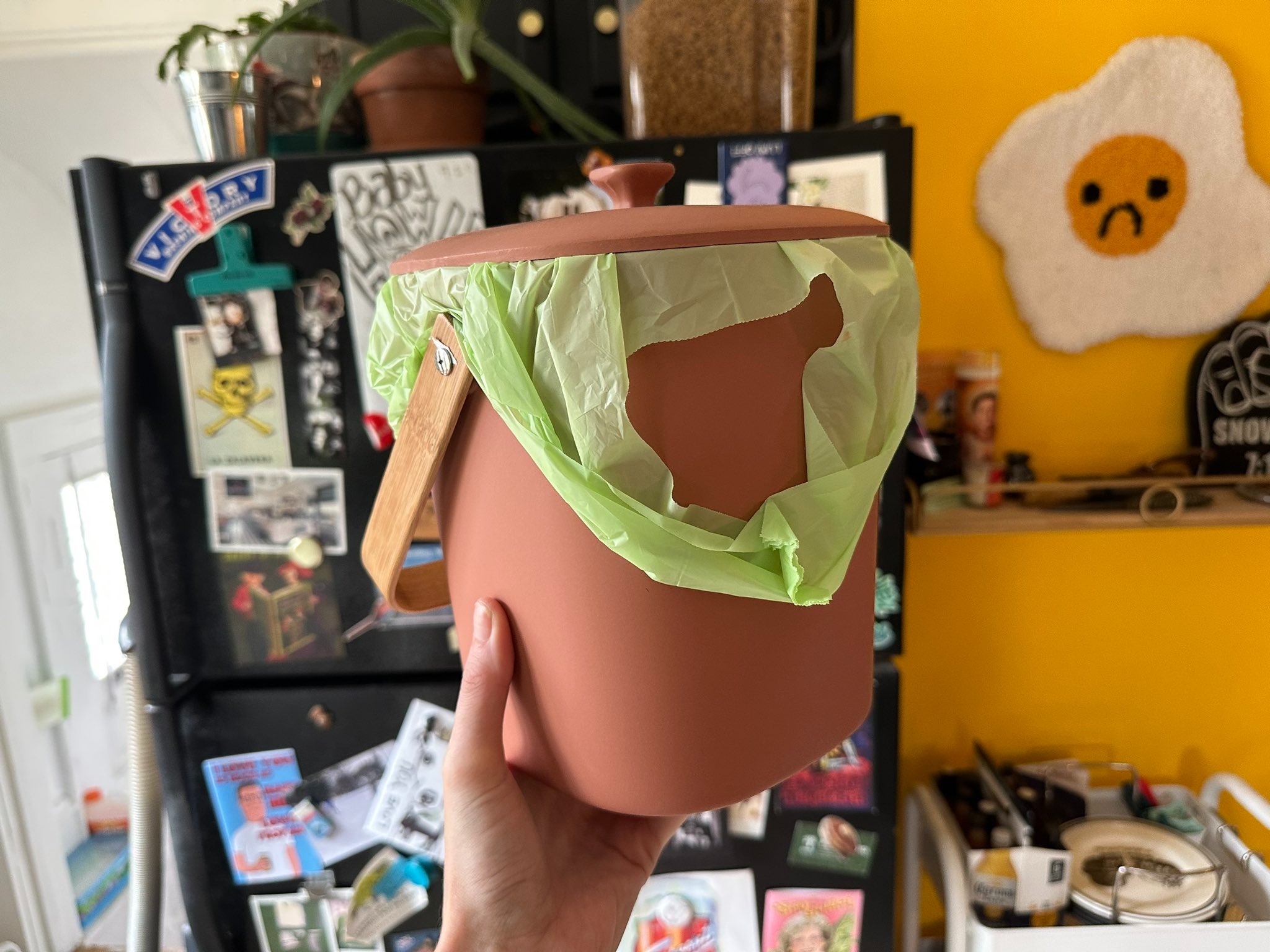I lived in Minneapolis, a city that was one of the first of its size in the U.S. to introduce citywide curbside organics pickup and is routinely lauded for its expertise, for about six years before I finally took advantage of the program myself.
I was intimidated! Trash is familiar!
When I finally did start composting last year, I got a lot of great advice from folks with significantly more composting experience than me, and I’d like to share some of that wisdom—along with some of the stuff I’ve learned myself over the last eight months—in the hope that it’ll help other folks who are just getting started on their composting journey.
And If you’re a Minneapolis homeowner or renter with city garbage service, you can quickly apply to get your curbside cart here!
1. Do What Works for You
Some people stash a 5-gallon bucket by their back door; some people keep a stainless steel bucket under the sink; some people stash a plastic bucket on the counter.
Compost bins come in all kinds of sizes, materials, and even colors—what works best for your household will depend on factors including your food consumption, the number of people in the home, and the amount of waste from uneaten food. I’ve found that a 1.15-gallon countertop bin (the one pictured above) is the perfect size for my one-person household. And I’ll be honest: It helps that it’s of the rather stylish variety, with a combination of form and function that makes me enthusiastic about consciously composting. When I’m trying to change my habits, that stuff matters!
2. Don’t Fear the Stink
I take my countertop compost out to the bin two or three times a week, and the smell really doesn’t get to be an issue. (I also opted for the $40 Bamboozle compost bin at the start of my composting journey, which is vented to allow airflow and filtered to reduce smell.)
There’s a scientific reason for this: “By keeping your organics in a pail on your counter or under your sink that has ventilation, it actually slows the decomposition process of the food scraps by allowing that moisture that comes from decomposition to evaporate from the container,” says Kellie Kish, recycling coordinator for the city of Minneapolis. “It actually creates less odors.”
Of course, certain scraps—banana peels, fish skins, spoiled produce—just sort of stink. Other folks recommended stashing your compost in the freezer or refrigerator to reduce the smell.
3. Toss Those Pizza Boxes
Minneapolis lets you recycle your greasy pizza boxes, along with paper egg cartons and certified compostable cups, plates, and utensils. Wooden items like toothpicks, chopsticks, and popsicle sticks can all go in the bin. Virtually all food is fair (fare?) game: meat and bones, dairy, nuts and shells, eggs and eggshells, coffee grounds, and teabags.
4. Think Outside the Kitchen
“Next Rubicon: THE BATHROOM,” someone replied when I asked for advice in September. It’s true, the bathroom is full of organics: paper, Q-tips, cotton balls, tissues, paper towels, and even hair—both human and pet—can be included in Minneapolis organics recycling.
5. Not All Bags Are Created Equal
The thing about compost bags is that they need to decompose, and sometimes they will… right there on your counter, especially if there’s a lot of moisture inside. BioBag was the brand first recommended to me, and I’ve had good luck with them thus far.
Other folks prefer using a paper bag rather than the little light green compostable bags, and some recommended keeping wetter scraps in a colander to dry out for a day before bagging them to reduce countertop decomposition.
6. No Wishcycling!
With regular recycling, workers can pull out non-recyclable materials like black plastics that have been improperly recycled. There’s no such leeway organics recycling. The non-organic material goes to the compost pile, where microbes in the heap eat the paper part and leave behind a plastic snake skin.
“The biggest issue are the lookalike food service items, things that say they’re biodegradable or made from plants or have a green leaf on them,” Kish explains. Only compost BPI Certified Compostable items, never things that say “made from plants.” Fruit and veggie stickers, paper coffee cups with a waxy plastic lining, etc.—those go in the trash, not the compost bin.
7. You Might Have to Deal with Critters
Your curbside compost bin can become a hot dining spot for area raccoons, which is why some folks recommend putting a brick or a paver on top of it. If you find you’re struggling with fruit flies around your countertop compost bin, many recommend a Zevo flying insect trap, but you can also try a cup of apple cider vinegar with a little dish soap. Giving your curbside cart a rinse from time to time can help keep you from getting maggots.
8. It’s Not OK to Waste Food Just Because It’s Being Composted
According to Kish, over 50% of what ends up in organics carts is scraps, inedible stuff. “But still, almost a quarter of what was in there was food that could have been eaten,” she says. “We really need to be better at meal planning, planning to do a leftover day, making sure we’re eating the food we buy, because the greenhouse gas emissions from food waste as a category is the third-highest of any country.”
9. You Might Find Your Habits Shifting Overall
And here is the cool thing I’ve noticed since I started composting: I’m making more of a conscious effort not to waste food. I’m making a grocery list, I’m eating leftovers, I’m cooking meals around what food is in the fridge, I’m ordering less takeout (itself a tremendous source of waste).
When you see how much you’re tossing in the bin, you start to be like, “Hm, that doesn’t seem good.” It makes you evaluate your other purchases, and you start asking, “How can I change my buying behavior to reduce more of what I’m putting in the trash?”






